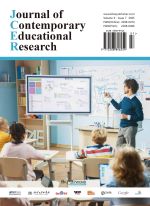Abstract
In the era of generative AI (GAI), translation is undergoing unprecedented transformations. GAI enhances translation quality and efficiency, inaugurating a new chapter in translation. However, due to its limitations, the complexity of translation, and the uniqueness of Zhuang medicine, cultivating the critical thinking ability among talents in English translation of Zhuang medicine has become critically important. This study reforms the teaching content, instructional design, and evaluation of the course Computer-Aided Translation Technology, and constructs a teaching model to enhance the critical thinking abilities among talents in English translation of Zhuang medicine. The result shows that this model establishes a critically thinking-oriented teaching system, promotes interaction between humans and machines, teachers and students, and among peers, and improves students’ capabilities in translation, critical thinking, and social communication.
References
Gao Y, Xu Y, 2015, Construction of Critical Thinking Ability Cultivation Model for Foreign Language Majors in China. Foreign Language Research, (02): 127–132.
Wang H, Xie Y, 2023, The Development of Translation Technology in the Era of ChatGPT and Its Implications. Foreign Languages and Cultures, 7(04): 80–89.
Xiao Y, 2023, Generative Language Models and Artificial General Intelligence: Connotations, Pathways, and Implications. People’s Forum·Academic Frontier, (14): 49–57.
Du A, 2023, The Value Space of Human Translation and Transformation of Translation Education in the ChatGPT Era. Foreign Languages and Cultures, 7(04): 90–103.
Eleni P, 2023, More Than Just Pronouns—Gender-Neutral and Inclusive Language in Patient Education Materials: Suggestions for Patient Education Librarians. Journal of the Medical Library Association: JMLA, (3): 734–739.
Gu W, Leng B, 2024, Four Types of Terminology Mistranslation by ChatGPT in Technical Translation: A Case Study of Mechanical Engineering Terminology. Chinese Science and Technology Translation Journal, 37(01): 24–27.
Li R, 2015, An Epistemological Exploration of the Ultimate Interpretation of Translation. Oriental Translator, (03): 9–11.
Ouyang L, 2009, On Translators’ Critical Thinking. Foreign Languages and Their Teaching, (08): 50–53.
Li R, 2011, From Translation Competence to Translator Literacy: The Paradigm Shift in Translation Pedagogy. Chinese Translators Journal, 32(01): 46–51 + 93.
Pang Y, 2005, Comparative Analysis of Zhuang Medicine and Traditional Chinese Medicine. Guangxi Journal of Traditional Chinese Medicine, (05): 45–46.
